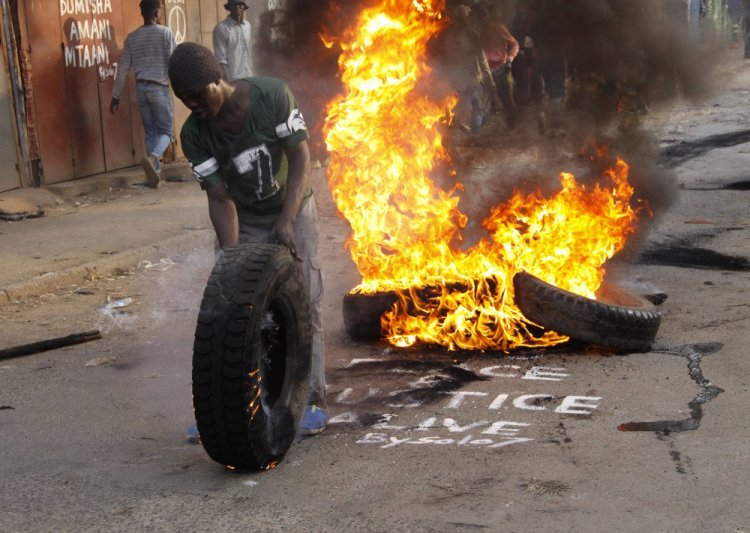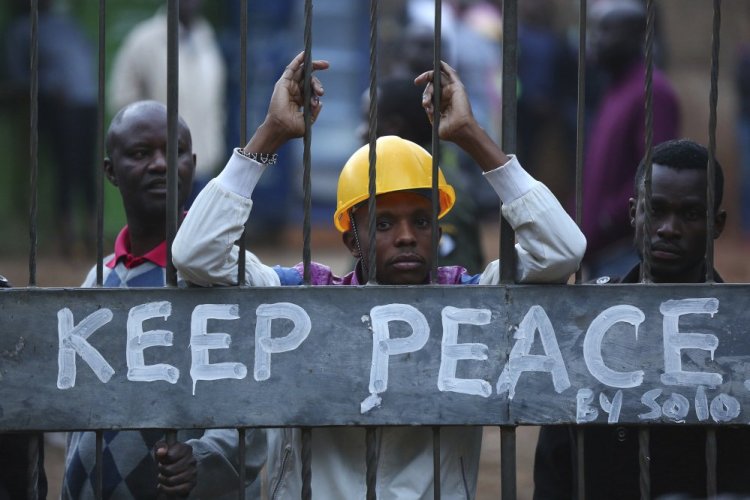NAIROBI, Kenya – Kenyan police opened fire Wednesday to disperse rioters in several areas after presidential challenger Raila Odinga alleged election fraud, saying hackers used the identity of a murdered official to infiltrate the database of the election commission and manipulate results in favor of President Uhuru Kenyatta. At least three people were killed.
As Kenyatta held a strong lead in provisional results with 96 percent of all polling stations counted, the election commission defended the voting system as secure, saying there were “no interferences before, during and after” Tuesday’s election.
Election officials were verifying the final tallies Wednesday night. It was unclear how long it would take, though by law election officials have up to a week from the election to announce the results.
Odinga, a former prime minister, blamed Kenyatta’s Jubilee Party for the alleged hacking. “The fraud Jubilee has perpetuated on Kenyans surpasses any level of voter theft in our country’s history. This time we caught them,” he tweeted.
Soon after Odinga claimed on television that the election had been rigged, angry protesters in the Nairobi slum of Mathare and poor areas in the opposition stronghold of Kisumu in the southwest burned tires, set up roadblocks and clashed with police.
Two people were shot dead in Nairobi as they took advantage of the protests to loot, Nairobi police chief Japheth Koome said. An Associated Press photographer said one was shot in the head. Police killed one person when they opened fire on protesters in another opposition stronghold in Kisii County, said Leonard Katana, a regional police commander.
Many parts of Kenya, East Africa’s commercial hub, remained calm, but the violence stirred memories of the unrest that followed the 2007 vote in which more than 1,000 people were killed. Odinga lost that election; he also lost the 2013 vote to Kenyatta and took allegations of vote-tampering to the Supreme Court, which rejected his case.
Odinga on Wednesday claimed that hackers used the identity of Christopher Msando, an election official in charge of managing information technology systems. On July 31, officials announced that Msando had been tortured and killed, alarming Kenyans who feared a recurrence of political violence fueled by ethnic divisions.
Odinga posted online what he said were computer logs proving his allegation. A Tuesday morning entry in the purported computer logs that Odinga posted on Facebook reads: “Login failed for user ‘msando’. Reason: The password of the account must be changed.”
Rafael Tuju, a top official in Kenyatta’s party, said the opposition’s claims were unfounded, and Kenya’s election commission said it would investigate.
Amid the uncertainty, some Odinga supporters erupted.
“He is not accepting the results and that is why we are on the streets, but police have started shooting,” said demonstrator Sebastian Omolo in Kisumu, one of Kenya’s largest cities. The western port city on Lake Victoria has been a flashpoint in past elections.
Kisumu shopkeeper Festus Odhiambo said he was praying for peace even as protesters blocked roads into city slums with bonfires and boulders.
Kenya’s interior minister, Fred Matiangi, warned against the use of social media to stoke tensions. Officials have said it was unlikely they would shut down the internet but said they might shut down some social media if necessary.
“We assure Kenyans and all residents, the country is safe,” said Matiangi. “I urge everyone to go on freely with their daily chores.”
Send questions/comments to the editors.




Success. Please wait for the page to reload. If the page does not reload within 5 seconds, please refresh the page.
Enter your email and password to access comments.
Hi, to comment on stories you must . This profile is in addition to your subscription and website login.
Already have a commenting profile? .
Invalid username/password.
Please check your email to confirm and complete your registration.
Only subscribers are eligible to post comments. Please subscribe or login first for digital access. Here’s why.
Use the form below to reset your password. When you've submitted your account email, we will send an email with a reset code.